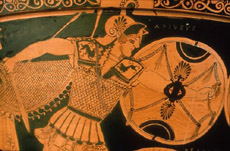Begging the Question
"Beg the question," also known in Latin as petitio principii, is a valuable term from logic, identifying a certain logical fallacy. To quote from Modern English Usage by Fowler,
Arguing in a Circle: The basing of two conclusion each upon the other. That the world is good follows from the known goodness of God; that God is good is known from the excellence of the world he has made.
Petitio Principii or Begging the Question: 'assumption of the basis'. The fallacy of founding a conclusion on a basis that as much needs to be proved as the conclusion itself. Arguing in a circle (see above) is a common form of p.p. That foxhunting is not cruel, since the fox enjoys the fun & that one must keep servants because all respectable people do so, are other examples of begging the question or p.p., in which the argument is not circular.
But the term "beg the question" is sometimes used today as though it meant that discussion of one matter implies another matter. And that raises the question: is the newer usage harmful?
Can we just rely on the dictionary? No, we cannot just point at a dictionary as though meaning were arbitrary or revealed truth. Some argue that whether a word or phrase is used rightly is to be determined by how people use it at the moment -- either that every usage of any word is ipso facto equally correct or that the meaning of words is discovered by taking a poll. However, neither personal nor social subjectivism nor revelation is a correct process. The right way to settle the matter is to ask whether the phrase names an objective distinction.
In this case, it does. It identifies a certain kind of error in logic, a type of mistake in thinking.
There is nothing inherently wrong with the evolution of language. However, if the original meaning of "beg the question" were supplanted by the newer usage, we would gain nothing not already identified by the phrase "raise the question" yet we would lose a term to identify the logical error. Since logical thought is important and knowing the common fallacies helps us to avoid error, our cognition will be harmed if we let the meaning of "beg the question" erode.
We should employ "beg the question" only to refer to the logical error of founding a conclusion on an unproved basis. To note that addressing one idea suggests the need to think about another, use "raise the question."
Books
- Modern English Usage by . The best reference on grammar and diction, with definitions and examples that are models of clarity. Preferably buy the first version, not the second or third, revised (and corrupted) versions. (out-of-print, see sources.)
copyright © 2024 Andrew Layman, all rights reserved, 1/15/2024 6:10:48 PM, Topic: Begging the Question, http://www.strongbrains.com
